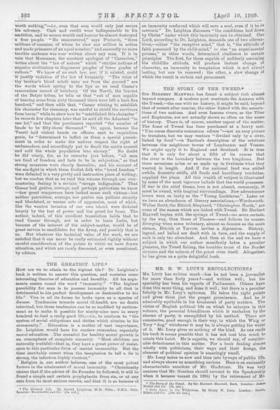THE STORY OF THE TWEED.*
SIR HERBERT MAXWELL has found a subject rich almost beyond compare. A modern poet contrasts the Amazon with the Tweed,—the one with no history, it might be said, beyond that of sunset after sunrise, the other linked with the associa- tions of two nations. And even famous rivers, as the Tiber and Euphrates, are not actually shown so often on the scene of history. There is, of course, another aspect of the matter. The fame of Tweed has been purchased at a heavy cost. "Una amue discretis connexutn odium "—not an easy phrase to translate, but we may venture "divided only by a river, linked by feud "—is Tacitus's description of the relations between the neighbour towns of Lugdunum and Vienne. We might apply it to England and Scotland. It is true that it is only for about a fifth of its course that the river is the boundary between the two kingdoms. But these seventeen miles or so made up in liveliness what they wanted in length. And if the national feud was stilled awhile, domestic strife, old feuds and hereditary vendettas, supplied the place. All this wealth of subject is illustrated by some of the most vigorous ballads that the world possesses. If war is the chief theme, love is not absent, commonly, it must be owned, with tragical surroundings. Few adventurous lovers were as lucky as the "Young Loolfinvar." Later on we have an abundance of literary associations,—Wordsworth. Walter Scott, the Ettrick Shepherd, "Christopher North," are some of the names which are linked with Tweed. Sir Herbert Maxwell begins with the springs of Tweed—no more certain, by the way, than those of Thames—and follows its course, diverging when some tributary, almost as famous as the main stream, Ettrick or Yarrow, invites a digression. History, legend, and ballad are dealt with in turn, and the supply of each is only too abundant. And then at the end we have a subject in which our author manifestly takes a peculiar pleasure, the Tweed fishing, the humbler trout of the Border streams and the salmon of the great river itself. Altogether, he has given us a quite delightful book.






































 Previous page
Previous page